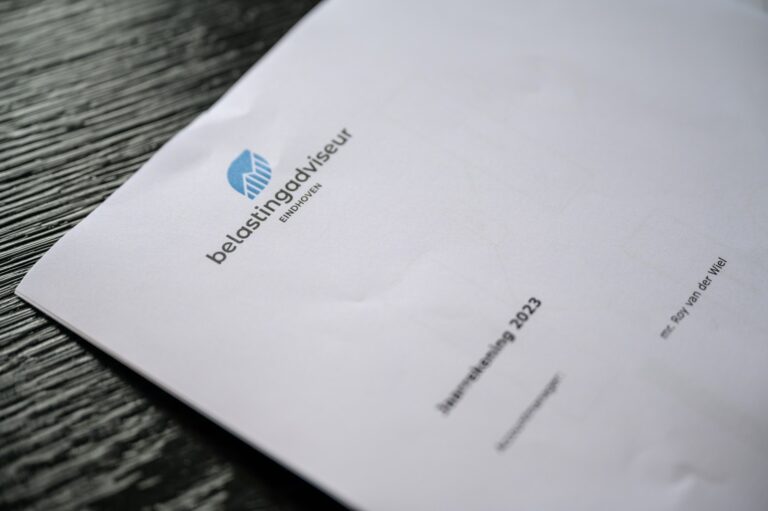
All about annual accounts
What exactly do annual accounts mean and what should you disclose in the annual accounts? Read more about it here.


When you set up a company or want to change its legal form, you have to choose which form to do it in. For example, you have the general partnership (vof) and the besloten vennootschap (bv). But what are the differences between the vof and bv? To make this important choice carefully, it is important that you know all the advantages and disadvantages of the legal forms. Therefore, in this article, we summarise everything you need to know.
There are many differences between a vof and a bv. A vof is like a partnership between two (or more) sole proprietorships, while in a bv there can also be cooperation only in a different way.
One main difference is that a vof always involves several partners, where a bv can also be driven by one entrepreneur. Further differences between a vof and a bv are liability, taxes, incorporation and costs, capital accumulation and structure.
| VOF | BV |
Liability | Accountable with private assets for vof debts | Limited liability, not liable with private assets |
Tax | Income tax | Dividend and corporation tax |
Founding | Verbal incorporation (not required at notary) and registration through the Chamber of Commerce | Via the notary and registration at the Chamber of Commerce required |
Start-up capital | No required initial capital | Minimum €0.01 |
Funding | Not attractive to directors and banks | Attractive to directors and banks |
Board | Partners | Management and shareholder(s) |
One of the main differences between a general partnership and a limited liability company is liability. In a general partnership, all partners are jointly and severally liable for all debts incurred by the partnership, with both the business assets in the general partnership and their private assets. If the vof then goes bankrupt, creditors can claim all private assets of all partners, as everyone is jointly and severally liable (there are exceptions to this if restrictions are included in the trade register and correct action is taken by the other partners after the unauthorised act). If there are large debts, this can have a big impact in the private situation. So take this into account during incorporation.
The liability of a bv is regulated differently from the liability of a vof. A bv is its own legal entity and therefore has a separated assets. As a result, in case of bankruptcy, only the assets of the PLC are liable. The shareholder(s) are not liable with their private assets, provided that, if they are also directors, they have not exhibited mismanagement.
Another important difference between a vof and a bv is the way they are taxed.
In the case of a general partnership, profits are taxed with the partners in Box 1 of the income tax. Each partner gets the share of the profit they are entitled to. Next, each partner must check whether they are entitled to the entrepreneurial deduction facilities. After which the taxable profit can be calculated.
The taxable profit per partner is taxed at the income tax rate of 36.97% up to an amount of €75,518 (2024), everything above is taxed at a rate of 49.50%. The tax credits may then be deducted from this to arrive at an affordable tax rate.
The taxation of a BV works slightly differently, as a limited company is not a company for the income tax but the corporate tax. The corporate tax rate (in 2024) is 19% up to a taxable profit of €200,000 and 25.8% for all taxable profits above that. Then you still have the net profit sitting in the PLC, and this will have to be distributed (partly) to private individuals.
With a limited liability company, every director-major shareholder (DMS), this is you if you are a director of the private limited company and own 5% or more of the shares, are required to receive (in 2024) at least €56,000 in wages from this private limited company. This wage, like all other wages from employment, is taxed in box 1 of income tax (36.97% and 49.50% rate). However, this wage payment may be deducted from profits before corporate tax is calculated. In addition, a dividend payment is taxed at the dividend tax rate of (in 2024) 24.5% up to a benefit of €67,000 and everything above at a rate of 33%.
Setting up a general partnership is very simple. You register with the Chamber of Commerce, the vof is then registered. You must also register the beneficial owner of the vof in the UBO-register. With a private limited company, this is slightly more complicated and expensive. To set up a BV, you need to go to the notary, as you need a notarial deed. A visit to the notaris kan al snel hoog in de kosten lopen, dit is iets om rekening mee te houden bij oprichting.
With both legal forms, it is important to make proper arrangements between them at incorporation, think of a partnership contract (vof) or a shareholders agreement (bv). Unforeseen things may happen during the existence of the vof or bv which may cause the company to be terminated. For this reason, it is useful to determine in advance what, for example, the contribution was at the time of incorporation, etc. so that no disagreements can arise.
With a private limited company, it is easier to attract investors. A private limited company has shares that can be sold/given away. At incorporation, all shares go to the founder(s). When the founders then start looking for investors, these investors can be promised shares (or bought with the amount to be invested) in exchange for the investment. This way, the investors also get a direct connection with the company and also benefit if, partly because of the investment, the company does well. With a general partnership, if someone wants to invest/enter the business, they are also immediately privately liable if they want to share in the profits. This is because it is not its own legal entity, so no shares can be given away. This can scare off investors, so a private limited company can be more attractive to both the owner and the prospective investor.
As stated before, a private limited company is a lot more advantageous to build up your assets in. This is because the liquid assets/properties of a private limited company are not taxed, as they are already subject to corporate income tax and dividend tax is only levied once it is distributed. In a general partnership, the profits are counted as the private assets of the partners and are therefore taxed in box 3, provided the value of all assets in box 3 exceeds € 57,000. Savings can be made in the sole proprietorship, by putting the net profit in a company account, but this is a lot less flexible than in the bv.
Another advantage of a private limited company is that you can set up more than one; a private limited company can also own another private limited company. So you can, for example, create a Holding limited company BV and a Working limited company BV set up to spread the risk even more. In practice, the holding company then usually holds all valuable assets and possessions and the working company performs all activities and concludes all contracts. By doing this, you build in another piece of extra security, because if the working company goes bankrupt because it can no longer pay its creditors, not only are you personally not liable, but the assets, possessions and liquid assets in the holding company are also inaccessible to creditors since the company has separate assets. The ability to set up multiple private limited companies allows you to make the structure the way you want it. A well-known saying is: 'one private limited company is not a private limited company'. Don't overcomplicate the structure with many redundant private limited companies. This often only adds costs and can be confusing for third parties as well as yourself. A very elaborate structure is often not necessary with medium/small entrepreneurs. A vof does not have this option.
Which is the best choice for you depends on your situation. Both business forms have their own advantages and disadvantages. The advantages of the vof are:
The advantages of a limited company are:
Als je nu een vof hebt en jouw onderneming groeit enorm, dan kan het interessant zijn jouw vof om te zetten naar een bv. Dit wordt voordelig wanneer je per vennoot €80.000 aan winst verdient met de vennootschap onder firma. Vanaf dit moment zetten veel ondernemers hun vof om naar een bv.
Do you have questions about your specific situation or would like support in the process of conversion to a BV. Then don't hesitate and contact us. Our experts will guide you through the entire process and are always there for you.

What exactly do annual accounts mean and what should you disclose in the annual accounts? Read more about it here.

Dissolving a sole proprietorship in the Netherlands requires some important tax and legal steps. Read more about it here.

A limited liability company (bv) in the Netherlands pays various taxes. In this article, we explain which taxes apply to a bv.

Belastingadviseur Eindhoven is part of Adviesgroep Eindhoven. The one-stop-shop for individuals, freelancers and directors and their companies.
Om de beste ervaringen te bieden, gebruiken wij technologieën zoals cookies om informatie over je apparaat op te slaan en/of te raadplegen. Door in te stemmen met deze technologieën kunnen wij gegevens zoals surfgedrag of unieke ID's op deze site verwerken. Als je geen toestemming geeft of uw toestemming intrekt, kan dit een nadelige invloed hebben op bepaalde functies en mogelijkheden.